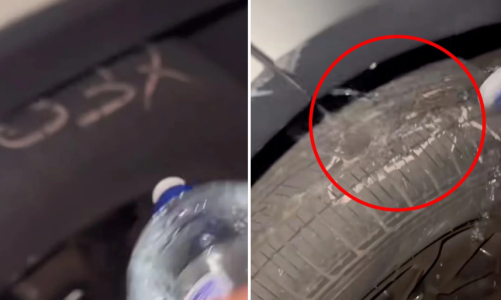One Aussie’s risky move could land you with a $750 fine: 'Is this even legal?'
By
Gian T
- Replies 0
If you’ve ever battled to find a parking spot, only to worry about what comes next, you’re not alone.
Some drivers have tried creatively to avoid trouble once parked, hoping to sidestep the rules.
But what seems like a harmless shortcut could lead to serious consequences. Fines in the hundreds and even the threat of jail are now part of the conversation.
A recent viral video has reignited the debate, showing a New South Wales resident pouring water over chalk-marked tyres to erase the evidence.
The internet, as always, was divided: some hailed the move as 'heroic', while others called for it to be 'normalised'.
But as fun as it might look online, legal experts are warning that this little stunt could have serious consequences.
For those unfamiliar, parking inspectors use chalk to mark tyres as a simple way to track how long a car has been parked in a spot.
If they return later and the chalk is still there, but the car hasn’t moved, you could be in for a fine.
It’s a low-tech but effective method that’s been around for years.
Here’s where things get interesting. According to Avinash Singh, a leading criminal lawyer at Astor Legal, the legality of removing chalk from your tyres depends on where you live.
In South Australia, it’s crystal clear: Section 174AB of the Road Traffic Act 1961 makes it an offence to remove a parking inspector’s chalk, with a maximum fine of $750 if you end up in court.
This law was brought in because so many people were trying to outsmart the system!
In other states, things are a bit murkier. There’s no specific law about chalk, but there are broader laws about 'perverting the course of justice'.
In NSW, for example, Section 319 of the Crimes Act 1900 makes it an offence to do anything intended to pervert the course of justice, with a maximum penalty of—wait for it—14 years in prison!
Queensland and Western Australia have similar laws, with penalties of up to seven years’ jail, and in Victoria, the common law offence carries a whopping 25 years’ maximum sentence.
Before you panic, Singh points out that it’s actually quite hard to prove someone has removed the chalk, unless a parking inspector catches you in the act or there’s clear video evidence.
So while the risk of a lengthy jail sentence is low, the potential for a hefty fine is very real, especially in South Australia.
If you think you’ve been unfairly fined, don’t resort to sneaky tactics. Instead, you can contest the fine by asking for evidence that you were actually parked for too long.
These days, many councils use time-stamped photographs, which are much harder to dispute than a bit of chalk.
If you believe the timing was off or the signage was unclear, you have every right to challenge the fine through the proper channels.
It’s no surprise that the video has captured the public’s imagination—after all, who hasn’t felt the sting of a parking ticket?
But as Singh says, 'The first thing you would think is, ‘Is this even legal?’ and that’s where the curiosity has come from.'
While it might seem like a harmless way to help your fellow Aussies, the law doesn’t always see it that way.
 Have you ever tried to outsmart a parking inspector, or do you have a funny parking story to share? Maybe you’ve copped a fine you thought was unfair, or you’ve seen someone try a cheeky trick like this. We’d love to hear your stories and tips in the comments below.
Have you ever tried to outsmart a parking inspector, or do you have a funny parking story to share? Maybe you’ve copped a fine you thought was unfair, or you’ve seen someone try a cheeky trick like this. We’d love to hear your stories and tips in the comments below.
Read more: This driver’s licence trend could land you in jail for 10 years—are you at risk?
Some drivers have tried creatively to avoid trouble once parked, hoping to sidestep the rules.
But what seems like a harmless shortcut could lead to serious consequences. Fines in the hundreds and even the threat of jail are now part of the conversation.
A recent viral video has reignited the debate, showing a New South Wales resident pouring water over chalk-marked tyres to erase the evidence.
The internet, as always, was divided: some hailed the move as 'heroic', while others called for it to be 'normalised'.
But as fun as it might look online, legal experts are warning that this little stunt could have serious consequences.
For those unfamiliar, parking inspectors use chalk to mark tyres as a simple way to track how long a car has been parked in a spot.
If they return later and the chalk is still there, but the car hasn’t moved, you could be in for a fine.
It’s a low-tech but effective method that’s been around for years.
Here’s where things get interesting. According to Avinash Singh, a leading criminal lawyer at Astor Legal, the legality of removing chalk from your tyres depends on where you live.
In South Australia, it’s crystal clear: Section 174AB of the Road Traffic Act 1961 makes it an offence to remove a parking inspector’s chalk, with a maximum fine of $750 if you end up in court.
This law was brought in because so many people were trying to outsmart the system!
In other states, things are a bit murkier. There’s no specific law about chalk, but there are broader laws about 'perverting the course of justice'.
In NSW, for example, Section 319 of the Crimes Act 1900 makes it an offence to do anything intended to pervert the course of justice, with a maximum penalty of—wait for it—14 years in prison!
Queensland and Western Australia have similar laws, with penalties of up to seven years’ jail, and in Victoria, the common law offence carries a whopping 25 years’ maximum sentence.
Before you panic, Singh points out that it’s actually quite hard to prove someone has removed the chalk, unless a parking inspector catches you in the act or there’s clear video evidence.
So while the risk of a lengthy jail sentence is low, the potential for a hefty fine is very real, especially in South Australia.
If you think you’ve been unfairly fined, don’t resort to sneaky tactics. Instead, you can contest the fine by asking for evidence that you were actually parked for too long.
These days, many councils use time-stamped photographs, which are much harder to dispute than a bit of chalk.
If you believe the timing was off or the signage was unclear, you have every right to challenge the fine through the proper channels.
It’s no surprise that the video has captured the public’s imagination—after all, who hasn’t felt the sting of a parking ticket?
But as Singh says, 'The first thing you would think is, ‘Is this even legal?’ and that’s where the curiosity has come from.'
While it might seem like a harmless way to help your fellow Aussies, the law doesn’t always see it that way.
Key Takeaways
- Aussies are being warned that removing chalk marks from car tyres to avoid parking fines is illegal in some states and could lead to hefty fines or even jail time.
- South Australia specifically outlaws removing a parking inspector’s chalk with a maximum penalty of $750, while other states may apply broader ‘perverting the course of justice’ laws with penalties including lengthy imprisonment.
- Legal experts say it’s difficult for authorities to prove someone has removed the chalk unless they have direct evidence, such as being caught in the act or filmed.
- Despite the risks, the viral tactic has sparked debate online, with some praising the move, but lawyers caution that better enforcement methods like time-stamped photos are making chalking less reliable.
Read more: This driver’s licence trend could land you in jail for 10 years—are you at risk?








